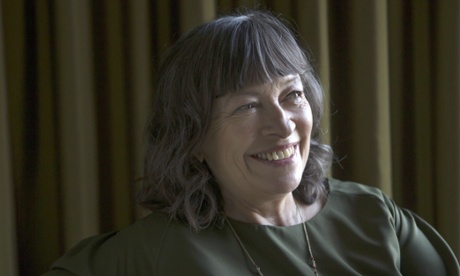
Timothy Spall deservedly won the best actor award at Cannes this year for his portrayal of the painter JMW Turner as a kind of intermittently tender warthog. How unfair, though, that the jury couldn’t stretch to a prize for Turner’s better half. In Mike Leigh’s film Mr Turner, there is no Mrs Turner. The nearest equivalent is Mrs Booth, a Margate landlady and widow with whom the artist found love and apparent serenity in later life. She is played by Marion Bailey, and it is no exaggeration to say that when she arrives on screen, it is as if a column of soothing sunlight has fallen upon a dank meadow. Mr Turner is a visually arresting film from its opening shot, but it is only with her arrival that it becomes fully a warm one, too.
Bailey has a similar effect on the nondescript office where we meet. Dressed in a grey top and checked scarf, she clutches a pair of snazzy black and orange sunglasses, which she taps against her leg for emphasis. “Not much is known about Mrs Booth,” says the 59-year-old actor. “And people vary quite a bit. Some said she was illiterate and garrulous. Ruskin was nice – he said after Turner died that she offered him sherry and cake, and gave him a few paintings. But hardly anyone knew of her existence at the time. There were stories of Turner leaving dining clubs in his cups and changing carriages on the way home to avoid people discovering where he lived. I think in some ways she represented his sanctuary.”
She speaks in a chipper, chatty manner, much like Mrs Booth, but in tones crisper than the character’s soft burr. She settled on that, she tells me, after extensive research into 19th-century life in Kent. Talk about thorough. But then that’s the Mike Leigh way. Fans of his work will know by now his method, in which he builds a character with each actor separately from scratch. Those characters are then brought together in group improvisations. Each scene, each line, that makes it into the film emerges here. “When I was at drama school, I was dutifully reading my Stanislavski. He says you have to decide how your character walks and talks, and I thought: ‘That’s all very well, but how?’ The way Mike does things makes so much logical, practical sense.”
Mr Turner is her sixth collaboration with him, following three films (Meantime, All or Nothing, Vera Drake) and two plays (Goose-Pimples, Grief). It has emerged publicly this week that she is also collaborating on something else with the 71-year-old filmmaker: a relationship. Bailey’s first encounter with Leigh’s writing, though, was when she acted in The Jaws of Death at the Croydon Warehouse theatre in the late 1970s.
“It was a play that Adrian Shergold had devised and done with him, so there was already a script. But Adrian didn’t let me see it: he wanted me to get the character on the go myself. He sent me out on to the street in character, which is one of the things Mike does. She was pretty thick, with a funny ponytail on one side of her head. Within five minutes of leaving the theatre, I – or rather, she – got picked up and taken out to lunch in character. I suppose this chap saw her as easy meat, which is disturbing. Halfway through lunch I managed to wriggle out of it. My brain was exploding. I thought, ‘I can’t believe this!’ But by the time I got back to the theatre, I knew that character.”
The most fondly remembered of Bailey’s characters is Barbara, the well-intentioned but doomed Essex housewife from Meantime, who tries condescendingly to help her unemployed nephew out of a rut. “Ah, Auntie Barbara,” she sighs. “Bless her. She was a bright girl.” Meantime provided early roles for a triumvirate of young British acting talent – Gary Oldman, Tim Roth and Phil Daniels – and emerged later as a key Britpop influence, beloved of bands such as Blur and Suede. “Phil, Tim and I used to fantasise that after the end of the film, Barbara and her nephews all got a flat together and lived happily ever after. That was our dream: that they’d escape that world. But that wasn’t Mike’s point at all.”
I ask if working with Leigh has spoiled her for other directors, and she gives an appalled laugh. “I can’t say that! I’d never work again!” Techniques learned with him have, she says, enriched everything else she does. And she has hardly wanted for other acting jobs, having appeared in almost every modern British TV series from Inspector Morse and Casualty to Midsomer Murders and Poirot. “That’s just age though, isn’t it? That’s being around a long time.” She even played four different characters on The Bill. “You have to have 18 months between them, so the viewers don’t get confused.”
Recently she was glorious as the Queen, sparring with Margaret Thatcher, in Moira Buffini’s mischievous play Handbagged. It’s a pity she didn’t go out on to the streets as HM, I say. “Oh, I did! Well, sort of. When I had to enter from the back of the auditorium at the start of act two, the only way was to leave through a side door, down this disgusting alley where people were taking drugs – Piss Alley, we used to call it – then out into the street and back through the foyer. So there was me as the Queen in rain-mac and Ugg boots. That caused some double-takes, I can tell you.”
• Mr Turner is released on 31 October and is at the London film festival on 10 and 11 October.

